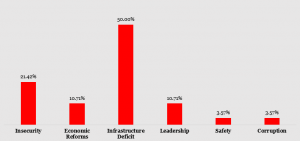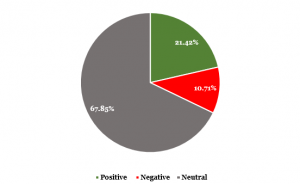
Nigerians Chide Leaders on Infrastructure Deficit, Insecurity as Lebanon Seeks Global Support
As the Lebanese government continues seeking support of global leaders and organisations in its efforts of evacuating people trampled in the Tuesday’s explosion that affected seaport at Beirut, Nigerians have used the call and world’s sympathy towards the country to chide their leaders. This is gleaned from the Nigerian Twitter community by our analyst, who monitored the community.
The Nigerian Twitter community in the last few hours has been using the callout of the Lebanese leaders to also voice out about infrastructure deficit, insecurity, the need to reform the economy, poor leadership, safety at the country’s seaports and the need to vigorously pursue the war on corruption. Like the Lebanese, 50% of 28 Nigerians in the community want attention on infrastructure development and an end to insecurity across the country, especially in the Northern region and some parts of the Southern region.
Register for Tekedia Mini-MBA edition 19 (Feb 9 – May 2, 2026): big discounts for early bird.
Tekedia AI in Business Masterclass opens registrations.
Join Tekedia Capital Syndicate and co-invest in great global startups.
Register for Tekedia AI Lab: From Technical Design to Deployment (next edition begins Jan 24 2026).
Exhibit 1: Issues and Needs for Nigerian Leaders

The Extracts
RT @MrSomtoOkonkwo: In Nigeria, thousands of People in Southern Kaduna Are Slaughtered By Fulani Herdsmen & Nothing Has Been Done To Stop This Genocide. Yet Buhari PA On Media, Bashir Ahmad Heart Was Shattered About The #explosion That Happened in Faraway #Beirut. #Hypocrites #RevolutionNow https://t.co/bYlpGNqFLc
Someone said Beirut will rebuild their country before we fix Apapa/Oshodi and I got weak the rot in Nigeria is deliberate.
RT @seyilaw1: I am willing to BET N2 Million with anybody that Beirut will rebuild their PORT before Nigeria will finish APAPA – OSHODI Expressway and
Despite expressing their feelings on the state of infrastructure, security and other issues or needs presented earlier, our analysis indicates that over 67% of the users were neutral to the issues or needs and the key stakeholders referred to or mentioned in their messages. This signifies that the users maintained a certain level of civility while expressing their views, and that it explains their intention of letting the leaders know the issues or needs without absolutely playing the name calling game.
Exhibit 2: Attitudinal Dispositions towards Issues and Needs




